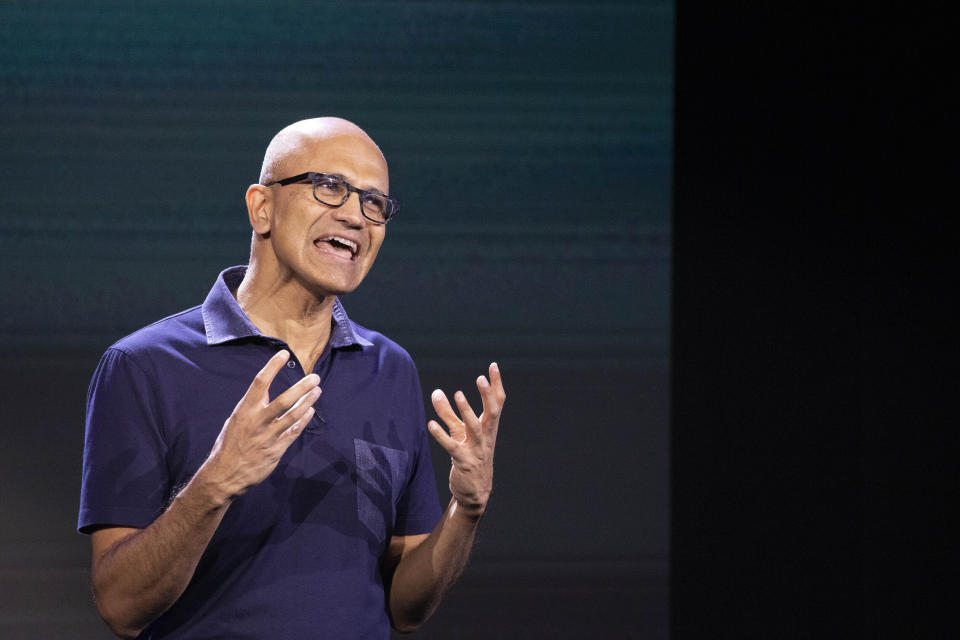Why Amazon is fighting the Pentagon over a controversial $10 billion contract awarded to Microsoft
There's a feud brewing between Amazon (AMZN) and Microsoft (MSFT) over a $10 billion Pentagon contract known as Project JEDI. On Thursday, Amazon declared that it’s protesting the government’s decision to award Microsoft an exclusive, 10-year contract to drag the Defense Department into the modern computing age.
"Numerous aspects of the JEDI evaluation process contained clear deficiencies, errors, and unmistakable bias — and it’s important that these matters be examined and rectified," an Amazon Web Services spokesperson said in a statement.

Microsoft didn’t immediately respond to a request for comment on Amazon’s move to protest the contract.
Project JEDI, or Joint Enterprise Defense Infrastructure, sets up the Defense Department with an advanced cloud computing system capable of handling artificial intelligence and other future technologies.
The JEDI contract was controversial from the start, with potential bidders deriding the specifications for the contract. And when it came down to Amazon and Microsoft as the front runners, it hit an even greater roadblock: President Donald Trump.
Trump previously raised concerns about Amazon’s involvement in the bidding process, saying he received complaints from other tech companies, including Oracle and IBM, because the contract calls for a single firm to assume control of the project.
In August, after it was apparent that Amazon was the frontrunner for the JEDI contract, then-newly appointed Defense Secretary Mark Esper ordered a review of the program.
Trump also has a notoriously acrimonious relationship with Amazon CEO Jeff Bezos, who owns The Washington Post, which has written numerous unflattering stories about the president.
"AWS is uniquely experienced and qualified to provide the critical technology the U.S. military needs, and remains committed to supporting the DoD’s modernization efforts," an Amazon spokesperson said in a statement. "We also believe it's critical for our country that the government and its elected leaders administer procurements objectively and in a manner that is free from political influence."
What is Project JEDI?
Project JEDI is the Department of Defense's plan to modernize its infrastructure so everyone from employees in the U.S. to soldiers on the frontline can access and manipulate data and support innovations in artificial intelligence at the speed of modern enterprises.
According to the DoD's statement of objectives for Project JEDI, the department "requires an extensible and secure cloud environment that spans the homeland to the global tactical edge, as well as the ability to rapidly access computing and storage capacity to address warfighting challenges at the speed of relevance."

In other words, the department's current systems are fragmented and slow the decision-making process within the DoD both at home and abroad. The idea is to create a cloud-based system that the DoD could easily deploy to ensure the U.S. maintains its military superiority over adversarial countries.
Who were the front-runners?
Before the project was awarded to Microsoft, Amazon and the Windows maker were seen as the leading candidates for the contract. Amazon is the world's largest cloud provider with 31.7% of the market in 2018, according to Canalys. Microsoft accounts for 16.8%, while Google has just 8.5%.
The DoD released its final request for proposal (RFP) for JEDI in July 2018, after receiving what it says were 1,500 comments and questions on previous RFPs.
But Amazon and Microsoft weren't the only companies with an interest in Project JEDI. Oracle (ORCL) and IBM (IBM), which are also players in the cloud market, were among a number of firms that sought to get a piece of JEDI's $10 billion contract. In the end, though, Amazon and Microsoft, which have a slew of data centers stationed throughout the world, and a history of working with the government, came in as the two finalists, the Pentagon said in April.

To put the size of that contract in perspective, Microsoft reported that it made $10.8 billion in revenue through its intelligent cloud division in Q1 2020. If the award stands, Microsoft will win a contract worth roughly as much as its entire cloud division makes in a single quarter.
Despite its own sizable cloud business, Google hasn't been a part of the RFP process for Project JEDI. According to Bloomberg, Google believed Project JEDI could compromise its corporate values. That move came shortly after the company let a Pentagon AI drone program deal lapse, following protests by Google employees.
A biased bidding process?
Amazon's position as one of the front-runners in the battle for that contract put a large target on its back. Oracle has claimed the DoD's request for proposals specifically favored Amazon and Microsoft.
Outside of those issues, multiple firms including Oracle, IBM, and even Microsoft have come forward to say the DoD shouldn't use a single cloud vendor for JEDI.
Microsoft's Leigh Madden, general manager of its defense and national security arm, told TechCrunch in 2018 the company wanted to win the contract but noted that 80% of businesses use multiple cloud vendors rather than a single offering.
In a statement issued to Yahoo Finance in August, a Microsoft spokesperson said, "We believe our over 40-year partnership with the DoD, in conjunction with our unique and differentiated enterprise cloud capabilities from the homefront to the tactical edge, best supports the DoD in advancing its mission and accelerating the speed in which they achieve the return on their cloud investments. We look forward to competing for the JEDI cloud contract and continuing to provide the DoD with our latest commercial innovations.”
It's not just companies that pushed back against the DoD's decision to use a single vendor or against its decision to name Microsoft and Amazon as finalists. Sen. Marco Rubio (R-FL), Senator Chuck Grassley (R-IA), and Representative Tom Cole (R-OK) have all expressed concern about the contract.
In August, Trump said that companies including IBM and Oracle had reached out to complain about the bidding process for JEDI. At the time, Trump said he would look into the matter, and Esper then held up the process for review.
Still, Microsoft ended up being awarded the project in October to the surprise of industry watchers, with Senator Mark Warner (D-VA) saying that it was important to keep the awarding of such contracts fair, and that Trump using his power to influence it would be inappropriate.
More from Dan:
'Pokemon Sword' and 'Pokemon Shield' review: The 'Pokemon' game I've always wanted
Amazon's $199 Echo Studio is a powerful smart speaker at a cut-rate price
Got a tip? Email Daniel Howley at [email protected] or [email protected], and follow him on Twitter at @DanielHowley.
Follow Yahoo Finance on Twitter, Facebook, Instagram, Flipboard, SmartNews, LinkedIn,YouTube, and reddit.
